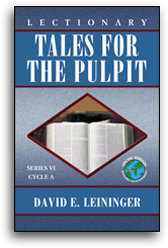SermonStudio
Sunday Dinner
Stories
Lectionary Tales For The Pulpit
Series VI, Cycle A
How many folks have tried to read the Bible all the way through but never were able to finish? A staggering number, probably. They did fine getting through Genesis and the great stories of Abraham, Isaac, Jacob, and Joseph. Exodus was not bad, especially the first half with the stories of Moses and the escape from slavery in Egypt. But the book of Leviticus proved to be a bit much -- all those ancient rules and regulations, instructions for priests, directions for sacrifices, dietary laws, and so on got to be like wading in molasses.


